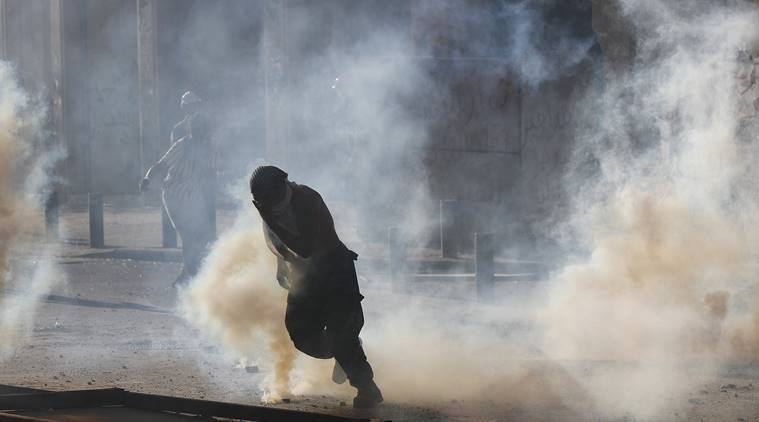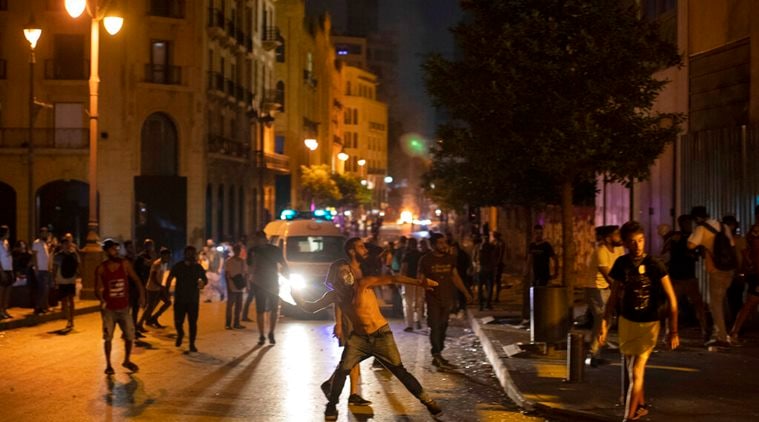 A demonstrator throws a stone during a protest in Beirut, Lebanon, August 10, 2020. (Reuters Photo: Goran Tomasevic)
A demonstrator throws a stone during a protest in Beirut, Lebanon, August 10, 2020. (Reuters Photo: Goran Tomasevic)
The catastrophic Beirut blasts on August 4, which left more than 200 dead and 6,000 injured, have reignited anti-government protests in Lebanon. Last Sunday, thousands of protesters pelted stones in central Beirut where Lebanon’s parliament is located. The demonstrations, which began peacefully, have since taken a violent turn, with police launching teargas canisters at protesters, who lobbed back firecrackers and rubble in return.
A day before, protesters stormed Lebanon’s foreign, economy and environment ministries to vent their anger, Deutsche Welle reported.
Why the Beirut explosion has reignited protests
The recent explosion was caused by 2,700 tonnes of ammonium nitrate stored for six years in a warehouse in the city’s port. Its negligence by officials has sparked widespread public anger, which had already been stoked over the past year due to serious economic woes.
According to a BBC report, the Beirut explosion has caused damage worth $3 billion, with the country’s collective loss estimated at $15 billion. Large parts of the capital city have been devastated.
The country’s economic downturn, at the centre of which has been a currency crisis, has caused large-scale closure of businesses and soaring prices of basic commodities resulting in social unrest.
📣 Express Explained is now on Telegram. Click here to join our channel (@ieexplained) and stay updated with the latest
 An anti-government protester runs from the smoke of tear gas, during clashes with riot police in Beirut, Lebanon, Saturday, Aug. 8, 2020. (AP Photo)
An anti-government protester runs from the smoke of tear gas, during clashes with riot police in Beirut, Lebanon, Saturday, Aug. 8, 2020. (AP Photo)
Lebanon’s long-running protests
The protests in Lebanon started in October 2019 after the government announced plans for new taxes during the 2020 budget season, on everything from tobacco to social media platforms like WhatsApp. Public anger escalated and expanded to wide-scale protests against an unstable economy, sectarian rule, unemployment and corruption, and also compelled a shake-up of the country’s leadership.
The mass protests that went on for weeks, petered down closer to Christmas and New Year, only to restart by the middle of January. In March this year, Lebanon’s government put the country in a state of emergency to combat the spread of coronavirus, closing land and seaports, and causing concerns that this would cause a further setback to an already beleaguered country. Lebanon’s financial crisis resulted in a sovereign debt default and also affected its currency’s value.
During the emergency, protest camps were ordered to be removed by the country’s security forces and restrictions were imposed on public gatherings. The government’s decision to remove these camps were interpreted by many, including sections of the country’s press, as a move to suppress protests.
 Anti-government protesters throw stones and clash with the riot police, during a protest against the political elites who have ruled the country for decades, in Beirut, Lebanon, Thursday, Aug. 6, 2020. (AP Photo: Hassan Ammar)
Anti-government protesters throw stones and clash with the riot police, during a protest against the political elites who have ruled the country for decades, in Beirut, Lebanon, Thursday, Aug. 6, 2020. (AP Photo: Hassan Ammar)
Another government change
Lebanon has been ruled by a political settlement that ended its 1975-1990 civil war, which distributes power and top offices among the country’s Shiites, Sunnis and Christians. While this complex sectarian system has largely been able to keep the country peaceful, it has made decision-making extremely difficult, with long periods of political gridlock.
The protests last October saw the ouster of the West-backed Prime Minister Saad Hariri, who headed a national unity government that was dominated by factions linked to the Hezbollah militant group. Now, the months-old government of PM Hassan Diab has also resigned. On Friday, Diab promised early parliamentary elections as a solution for the country’s structural crisis.
Also in Explained | The Beirut-like explosion that rocked Bombay 76 years ago, killing over 1,000 people
📣 The Indian Express is now on Telegram. Click here to join our channel (@indianexpress) and stay updated with the latest headlines
For all the latest Explained News, download Indian Express App.
© The Indian Express (P) Ltd
Top stories - Google News
August 10, 2020 at 08:37PM
https://ift.tt/3acNK9b
Explained: Why the Beirut explosion has caused widespread anger in Lebanon - The Indian Express
Top stories - Google News
https://ift.tt/2FLTecc
Shoes Man Tutorial
Pos News Update
Meme Update
Korean Entertainment News
Japan News Update
Bagikan Berita Ini














0 Response to "Explained: Why the Beirut explosion has caused widespread anger in Lebanon - The Indian Express"
Post a Comment